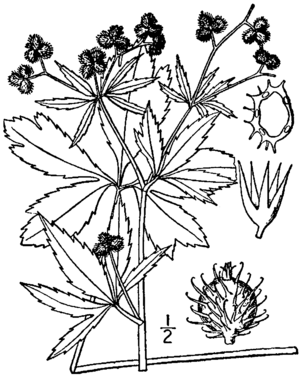Canadian blacksnakeroot facts for kids
Quick facts for kids Canadian blacksnakeroot |
|
|---|---|
 |
|
| 1913 illustration | |
| Scientific classification | |
| Genus: |
Sanicula
|
| Species: |
canadensis
|
Sanicula canadensis, also known as the Canadian blacksnakeroot, is a plant that naturally grows in North America. It belongs to the Apiaceae plant family. This plant can live for two years (biennial) or many years (perennial). It mainly spreads by dropping its seeds. The Canadian blacksnakeroot usually grows between 1 and 4.5 feet tall. You can find it in moist forests where trees lose their leaves in the fall.
About the Canadian Blacksnakeroot
The Canadian blacksnakeroot has small, whitish-green flowers. These flowers appear in late spring or early summer and stay for about three weeks. The sepals (leaf-like parts protecting the flower) are longer than the petals (the colorful parts of the flower). After the flowers, the plant produces green, bur-like fruits. Each of these fruits splits into two seeds.
Where It Grows
This plant is found across a large area in eastern North America. Its range covers most of the eastern United States, from Quebec and Ontario in Canada down to Texas and Wyoming in the west.
How It Spreads
The Canadian blacksnakeroot mostly spreads using its seeds. The bur-like fruits help the seeds attach to animals or clothes, carrying them to new places. This helps the plant grow in many different areas.
See also
 In Spanish: Sanicula canadensis para niños
In Spanish: Sanicula canadensis para niños

